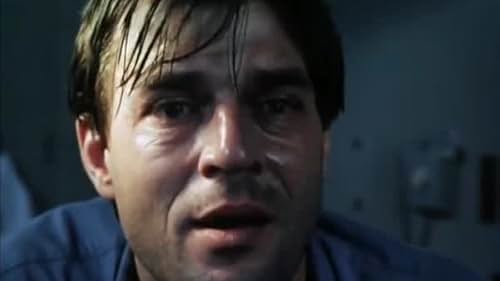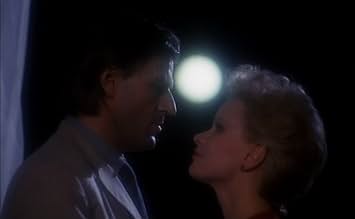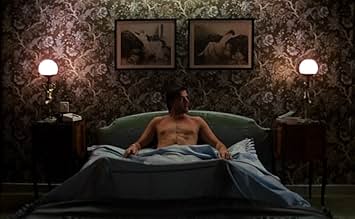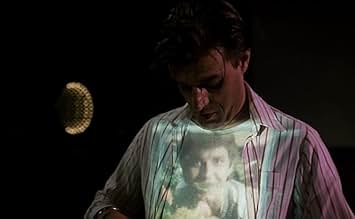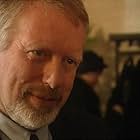A man who has been having visions of an impending danger begins an affair with a woman who may lead him to his doom.A man who has been having visions of an impending danger begins an affair with a woman who may lead him to his doom.A man who has been having visions of an impending danger begins an affair with a woman who may lead him to his doom.
- Director
- Writers
- Stars
- Awards
- 4 wins & 2 nominations total
- Director
- Writers
- All cast & crew
- Production, box office & more at IMDbPro
Featured reviews
Verhoeven has often claimed that the somewhat skewed, surreal and heavily atmospheric look and feel of the film was purposely stylised to an almost obvious degree in order to placate the high-brow Dutch film critics who had, at that particular time in his career, dismissed previous films such as Keetje Tippel (1975) and Spetters (1980) as lurid sensationalism. Whether or not this is the case is open to debate, but what most impresses here is Verhoeven's energy and skill in presenting such a taut and labyrinthine thriller that seems to draw as much on the surreal and coolly evocative psychodrama of a filmmaker like Ingmar Bergman as it does on the twisted world of Alfred Hitchcock. From beginning to end, The Fourth Man offers old fashioned suspense and bold strokes of drama, all contrasted and juxtaposed against the director's moody, European style and liberal bursts of violence and eroticism. The design of the film - rich with over-saturated light and colour, shades of autumn and lingering camera movements - suggest a world hinged somewhere between the noir-like stylisation of Bernardo Bertolucci's The Conformist (1970) and the vibrant, lurid surrealism of Dario Argento's Suspiria (1977), to add further depths to the already densely layered mystery, and to create a world that seems real, but at the same time, entirely dreamlike.
The film works on a number of levels; on the one-hand, as a piece of pure entertainment, with Verhoeven's always memorable use of imagery - both grotesque and beautiful - and his scenes of upfront and often confrontational violence and sexuality. The film is as much about sexuality and desire as it is about sex; with Gerard introduced initially as gay, though he later has an affair with the central femme-fatale, but only after he has flattened her small breasts with his hands and confessed that she "looks like a boy". Later in the film he will seduce the fiancé of this character and again raise questions pertaining to the film's central enigma. In the most telling scene, Gerard attends a Q&A session for his new book. When someone in the audience asks him about his secret for writing, Gerard replies "I lie the truth". Perhaps a poor subtitle translation, but the implication that Gerard sees the world through a somewhat false perspective is certainly there; with the further elements of alcoholism, sexual confusion, lust and paranoia creating a fascinating central character, quite possibly creating the story in his mind as it moves along.
There are Hitchcockian allusions as noted, with the cold, blonde femme-fatale person represented by Christine, who has an air of subtle menace and great sexuality. Is Gerard seducing her or is she seducing Gerard, and just why have three of her past husbands turned up dead in recent years? Is Gerard imagining all of this? Is he genuinely interested in Christine, or is he more interested in getting closer to the man in her life? Are his reasons purely sexual or are they a further fuelled by his lurid obsessions with death? Questions like this crop up constantly with The Fourth Man, with Verhoeven denying the audience easy answers and instead plunging headlong into surreal visions of rotting eyeballs, strung-up meat carcasses, puddles of blood and the juxtaposition of homoerotic yearning with Christ-like metaphors. There's also a continual use of black-widow symbolism apparent right from the start, as well as all the elements coming together at the end in a sort of tragic foreshadowing of events. Even then, do we believe Gerard and his wild accusations, or is this just another example of the alcoholic, over-sexed writer "lying the truth" for the purposes of fiction.
The Fourth Man is a film that I haven't seen in a long time, but its images and story have always stayed with me. On my initial viewing in 2001, my familiarity with Verhoeven was based purely on his satirical Hollywood pictures, principally Robocop (1986), Total Recall (1991) and Starship Troopers (1997). I was also fairly unfamiliar with European cinema in general, meaning that the film's bold scenes of both straight and gay sex, nudity and imagined (or are they?) scenes of surreal, sexualised violence were a real revelation. A few years later I returned to the film and found it just as fascinating; with the labyrinthine plot, moody visuals, bold performances and totally entrancing story and character drawing me in; offering a great central mystery that is visually captivating and rife with a myriad of potential interpretations. It's easy to say that The Fourth Man is one of my favourite films; filled with cool irony, controversial images and ideas, and a completely fascinating, dreamlike evocation of the story at hand.
Krabbe plays real-life writer Gerard Reve whose books are very well-known in the world of literature. He is asked to speak at a function attended by several prominent literary fans. Strange clues are revealed in his journey. He has a hallucination on the commuter train of an eye squishing and oozing through a hotel room door and of his name on a coffin. Later, at the function, a strange woman follows him with a camera, videotaping his every move. She is Christine Halsslag, a hairdresser who is incidently the groups treasurer and says she is videotaping him as '' a memory of his visit''. Though Reve is annoyed by her pestering camera, they seem to hit it off. She shows him the hotel where the group has paid for his room in case he is too tired to go home on the train. His eyes widen, it is the same hotel where the eye oozed through the door. Seeing he is unnerved, Christine asks him if he wants to stay with her. He accepts her offer and.....Things really begin to hit it off......
Soon, some strange things are revealed. It seems that Chrissy's been married three times and her three husbands have died rather bizarre deaths. After seeing a picture of Christine's sometime boyfriend. Herrman, Reve becomes determined to sleep with him and tries to manipulate Christine to invite Herrman back. But, who is doing the real manipulating?
The film is set up similar to a Kubrick film in that everything is told in riddles and visuals that tell the story in a way that resembles some kind of fable of good and evil. The film has much religious symbolism: the opening shot is of a spider crawling over the figure of Christ on the cross and Reve himself seems to have religious visions of what may be the Virgin Mary. Christine herself begins to act strangely: she drives a bit too recklessly for him. The film is very similar to Verhoeven's 'Basic Instinct' in that we have a main character who may be fatally attracted to a killer and the potential murderess has a cold, kinky style that is too strong to resist. Soutendijk even has a resemblance to Sharon Stone: the blonde hair, the sexy yet evil smile, she's like a dramatic version of Elizabeth Hurley's devil in 'Bedazzled'. She so obviously but so easily poisoning him with her sexiness, she is like a devil, tempting the hero with endless pleasure for a high price. If the Virgin Mary finds it so important to protect Reve, isn't it conceivable that Christine is a manifestation of the devil. A behavior near the end seems to suggest this, she is done with Reve and needs to move on to a new soul
Believe it or not, I haven't given away anything. The film twists in so many directions that some things may or may not have ever happened. The film is astonishingly and intelligently directed by Verhoeven and after seeing this, you will be tempted to see his other Dutch films before he was Hollywoodized. Afterwards, I found myself wishing that Verhoeven would do another one of these, a sexy, smart and stunning film.
Paul Verhoeven twists the truth many times in this film, and that ensures that you never quite know where you are with it. Many of the occurrences in The Fourth Man could be what they appear to be, but they could easily be interpreted as something else entirely and this keeps the audience on the edge of their seats for the duration, and also makes the film work as this narrative is what it thrives on. Paul Verhoeven is not a filmmaker that feels he has to restrain himself, and that is one of things I like best about him. This film features a very shocking scene that made me feel ill for hours afterwards (and that doesn't happen very often!). I wont spoil it because it needs the surprise element to work...but you'll see what I mean when you see the film (make sure you get the uncut version!). There is also a number of other macabre scenes that are less shocking than the one I've mentioned, but are lovely nonetheless; a man gets eaten by lions, another one has a pipe sent through his skull, a boat is smashed in half...lovely.
The acting in The Fourth Man isn't anything to write home about, but it's solid throughout. Jeroen Krabbé holds the audience's attention and looks the part as the drunken writer. It is Renée Soutendijk that impresses the most, though, as the femme fatale at the centre of the tale. Her performance is what Sharon Stone would imitate nine years later with Basic Instinct, but the original fatale did it best. Paul Verhoeven's direction is solid throughout as he directs our attention through numerous points of view, all of which help to create the mystery of the story. Verhoeven has gone on to make some rubbish, but he obviously has talent and it's a shame that he doesn't put it to better use. Of all the Verhoeven films I've seen, this is the best and although it might be difficult to come across; trust me, it's worth the effort.
Storyline
Did you know
- TriviaForty actors were tested for the part of Herman. Thom Hoffman got the part because he was the only actor bold enough to give Jeroen Krabbé a French kiss during his screentest.
- GoofsWhen Gerard and Herman go back to the convertible after a rainstorm, the car's interior is dry.
- Quotes
Gerard Reve, Herman: [are confronted with a sudden shower]
Herman: Damn weather!
Gerard Reve: [yelling and pointing to trees] There!
Gerard Reve, Herman: [ran to the trees]
Herman: We all get soaked!
Gerard Reve: That one's open!
Gerard Reve, Herman: In that tomb?
Gerard Reve: Dead men don't bite, only live ones do.
Gerard Reve, Herman: [going inside]
Herman: [got licked by Gerard and turns towards him] Do you want to get hit?
Gerard Reve: It wouldn't be the first time. But you won't.
Herman: Won't I?
Gerard Reve: No...
[pulls up Herman's shirt, touches his breast]
Herman: Do you think I'll like it?
Gerard Reve: I'm gonna try...
Herman: Keep going, Gerard.
Gerard Reve: [kisses Herman] I saw you at the station... and your picture later on... such a beautiful boy.
Gerard Reve: [after French kissing] I thought I've got to have him, even if it kills me.
Herman: I like your spiel... nobody's ever told me that before.
Gerard Reve: Spieling is my profession. I kept lobbying with Christine... and hoping that you would come.
Herman: I like you going for me, Gerard.
[going down on him]
Gerard Reve: I, dirty old man.
- Alternate versionsItalian version is largely censored. It runs 98 minutes (more than 5 minutes shorter than the original version).
- ConnectionsFeatured in Schau mir in die Augen, Kleiner (2007)
- How long is The 4th Man?Powered by Alexa
Details
- Release date
- Country of origin
- Languages
- Also known as
- Cetvrti covek
- Filming locations
- Production companies
- See more company credits at IMDbPro
Contribute to this page


